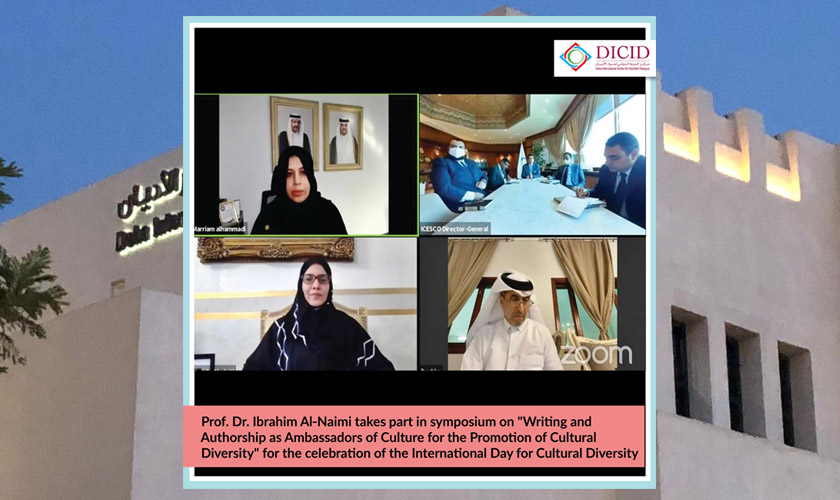
24 May Prof. Dr. Ibrahim Al-Naimi takes part in symposium on “Writing and Authorship as Ambassadors of Culture for the Promotion of Cultural Diversity”
His Excellency Prof. Dr. Ibrahim Al-Naimi, Chairman of the Doha International Center for Interfaith Dialogue and the Undersecretary of the Ministry of Education and Higher Education, participated on Wednesday May 19, 2021, in a symposium held by the Qatari Forum for Authors (online) entitled: “Writing and authorship, as cultural ambassadors to promote cultural diversity,” as part of the celebration of the International Day for Cultural Diversity that falls on May 21 every year.
The symposium opened with a speech by His Excellency Mr. Salah bin Ghanem Al-Ali, Minister of Culture and Sports, and a lengthy session followed that included two main themes: The first theme was Promoting cultural diversity through books and writing, and the second theme was Translation bridges for understanding and mutual respect between cultures.
In his opening speech, His Excellency the Minister said: “The effectiveness of Doha, the capital of culture in the Islamic world, affirms that culture is a light that illuminates the path of human civilization, and it is a safety valve for society as it is closely related to identity”
Dr. Hamda Hassan Al-Sulaiti, Secretary-General of the Qatar National Commission for Education, Culture and Science, and His Excellency Dr. Salem bin Muhammad Al-Malik, Director-General of the Islamic World Organization for Education, Science and Culture (ISESCO) also participated in the symposium.
Dr. Ibrahim Al-Naimi’s participation in the first segment came with a long speech entitled: “Interfaith dialogue between cultural diversity and the shared humanity” in which he discussed three main topics: religious dialogue and our contemporary reality, from dialogue forums to the culture of dialogue, and the Doha International Center for Interfaith Dialogue’s contributions to enrich writing and publishing.
Dr. Ibrahim Al-Naimi began his speech by saying, “In spite of all the crises and problems that surround the Arab region and the world at large, Qatari efforts to spread culture and thought – including the culture of dialogue – are proceeding at a fast pace, and they are recording successive achievements, whose role is evident in strengthening the efforts of the Alliance of Civilizations and Dialogue. Religions whose goals and areas of work intersect with Qatari efforts to promote coexistence, peace and security in the world. ” He added: “The State of Qatar has seen that these efforts are a unique opportunity for all nations to transcend the traditional national framework and self-centered reformist ideologies that does not see the interests of others, to the field of exchanging ideas about what unites nations, how to deal with what divides them, and ways to confront what threatens them.
This is based on the premise that building nations begins with building man, and this construction takes place through cooperation with his fellow man. To build a society and reshape a world based on mutual respect and coexistence in harmony and peace, regardless of the differences in religions, cultures and ethnicities.
He concluded his speech by presenting an invitation to writers and authors by saying: “I sincerely invite Arab and Muslim thinkers and writers to intensify cultural dialogues, especially those concerned with interfaith dialogue, cultural and intellectual diversity, and dialogue of civilizations, and for us to have an intellectual, knowledge and philosophical depth of the importance of this dialogue, its foundations, principles and methods, and to spread this thought among the young, so that we have young Muslim thinkers and researchers and an emergence of a humanitarian intellectual research movement that takes inspiration from the principles of religion and applies them in dialogue with other religions and cultures.
In her speech, Dr. Hamda Hassan Al-Sulaiti said that the State of Qatar has been keen for a long time to pay attention to cultural diversity and the dialogue of cultures and civilizations, believing in the effective role of cultural diversity, cultural and intellectual dialogue, respect for other cultures in the rapprochement between peoples, and the promotion of the values of tolerance, peace and security in the world; effects of these on building societies are in line with achieving the goals of sustainable development.
She added that out of our responsibility as active members in the intergovernmental committees that agree to protect and promote diversity in cultural expressions in UNESCO, the State of Qatar hosts many conferences, seminars and forums on dialogue between cultures, civilizations and religions, including the cultural diversity festivals, which are held annually in Katara with the participation of many countries of the world. Doha also embraces the Doha International Center for Interfaith Dialogue (DICID) and the Qatari Committee for the Alliance of Civilizations, which aims to promote dialogue and openness, consolidate the values of tolerance, solidarity and peace among peoples, and reject violence, intolerance and extremism.
For his part, His Excellency Dr. Salem bin Muhammad Al-Malik expressed his happiness to participate in this celebration, for which this year’s forum chose the topic of writing and authorship as cultural ambassadors to promote cultural diversity, describing this choice as valid, consistent with the goals pursued by the events in Doha, the capital of culture in the Islamic world 2021. Within the “ISESCO” program to celebrate the capitals of culture in the Islamic world, and within the framework of the “ISESCO” declaration on cultural diversity.
In this context, Dr. Al-Malik said, “ISESCO” attaches, within its new strategic plan, great attention and a high position to issues of cultural diversity and civilizational dialogue, basing in this on a number of principles and constants, including rational openness to the countries of the world, in order to enhance the values of coexistence between people of diverse cultures and to consolidate the culture of dialogue between the components of the international community, and to highlight the values of Islam of brotherhood and peace, and from the teachings calling for acquaintance and loyalty.



Sorry, the comment form is closed at this time.